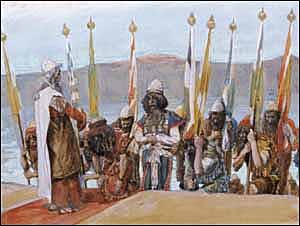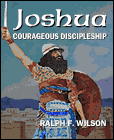Free E-Mail
Bible Studies
Beginning the Journey (for new Christians). en Español
Old Testament
Abraham
Jacob
Moses
Joshua
Gideon
David, Life of
Elijah
Psalms
Solomon
Songs of Ascent (Ps 120-135)
Isaiah
Advent/Messianic Scriptures
Daniel
Rebuild & Renew: Post-Exilic Books
Gospels
Christmas Incarnation
(Mt, Lk)
Sermon on the Mount
(Mt 5-7)
Mark
Luke's
Gospel
John's Gospel
7 Last Words of Christ
Parables
Jesus and the Kingdom
Resurrection
Apostle Peter
Acts
The Early Church
(Acts 1-12)
Apostle Paul
(Acts 12-28)
Paul's Epistles
Christ Powered Life (Rom 5-8)
1 Corinthians
2 Corinthians
Galatians
Ephesians
Vision for Church
(Eph)
Philippians
Colossians,
Philemon
1
& 2 Thessalonians
1 & 2 Timothy,
Titus
General Epistles
Hebrews
James
1 Peter
2 Peter, Jude
1, 2, and 3 John
Revelation
Revelation
Conquering Lamb of Revelation
Topical
Glorious Kingdom, The
Grace
Great Prayers
Holy Spirit, Disciple's Guide
Humility
Lamb of God
Listening for God's Voice
Lord's Supper
Names of God
Names of Jesus
Christian Art
About Us
Podcasts
Contact Us
Dr. Wilson's Books
Donations
Watercolors
Sitemap
 James J. Tissot, 'Moses Blesses Joshua before the High Priest' (1896-1902), gouache on board, Jewish Museum, New York. |
The Book of Joshua isn't politically correct.
First, it indicates that God favors one people -- Israel -- over all others. That seems to run contrary to our sense of universal tolerance of all races and peoples. What's more, God has promised land to them -- land that at the beginning of the book is occupied by others -- the Promised Land.
Second, the book is blatantly war-like. It assumes a God-given mandate to conquer the Promised Land by force of arms. Joshua himself is a warrior, a military leader as well as political leader. To modern-day pacifists, a warlike attack is an anathema. They prefer the "meek and mild" Jesus (whose name, by the way, was derived from "Joshua").
Third, the book of Joshua takes literally God's command to wipe out the pagan Canaanites who dwell in the Promised Land. We discuss this at length in Appendix 6.
Fourth, the book assumes a God who is all-powerful, the King of the Universe, who demands our complete allegiance. That's troubling to a self-absorbed, democratic mindset that wants its own way. We would rather construct a designer God in our own image, rather than let Him be as the Bible portrays Him.
Nevertheless, the Book of Joshua is firmly a part of the Old Testament canon of Scripture. It is the natural successor to the Book of Deuteronomy, explaining how Israel worked out God's commands to enter the Promised Land.
If you can get past your culture shock with the Bronze Age in which the book is set, Joshua has much to teach us. Lessons include:
- Submission to God as Leader, rather than seeing first if he's on our side or our enemy's.
- God's faithfulness to fulfill his promises.
- Obedience to God's commands, and the lasting consequences of disobedience.
- Listening for God's direction, rather than doing what seems right in our own eyes.
- God's power to accomplish his will, seen in stopping the Jordan River at flood stage, breaking the walls of Jericho at his people's shout.
- God's provision for his people -- the manna continues until the Israelites are able to eat of the produce of their new land.
- How sin can affect not only an individual but a covenant people.
- A call to reject allegiances to gods and values foreign to God.
- Faith in God and courage to follow him.
and much more....
It is the faith of people like Joshua, Rahab, and Caleb that we want to understand and emulate. At age eighty-five, Caleb, one of the original 12 spies of Canaan, asked for the hill country around the walled city of Hebron to be his inheritance and Joshua granted it to him. "Give me this mountain," he says, and proceeds to take it from the giants who live therein, giants who had caused the Israelites to fear forty-five years previously. I want that kind of bold faith. Joshua is faith-food for believers.
The Book concludes with Joshua's final challenge.
"Choose for yourselves this day whom you will serve, whether the gods your forefathers served beyond the River, or the gods of the Amorites, in whose land you are living. But as for me and my household, we will serve the LORD." (24:15)

Lessons in book formats are available. |
That challenge given to God's people three millennia ago is fresh and vital to us in the twenty-first century:
"Throw away the foreign gods that are among you and yield your hearts to the LORD, the God of Israel." (24:23)
May God bless you as you study this great book and internalize its discipleship lessons of faith, courage, and obedience.
Dr. Ralph F. Wilson
Loomis, California
June 1, 2016
Copyright © 2025, Ralph F. Wilson. <pastor![]() joyfulheart.com> All rights reserved. A single copy of this article is free. Do not put this on a website. See legal, copyright, and reprint information.
joyfulheart.com> All rights reserved. A single copy of this article is free. Do not put this on a website. See legal, copyright, and reprint information.
 |

|
In-depth Bible study books
You can purchase one of Dr. Wilson's complete Bible studies in PDF, Kindle, or paperback format -- currently 48 books in the JesusWalk Bible Study Series.
Old Testament
- Abraham, Faith of
- Jacob, Life of
- Moses the Reluctant Leader
- Joshua
- Gideon
- David, Life of
- Elijah
- Psalms
- Solomon
- Songs of Ascent (Psalms 120-134)
- Isaiah
- 28 Advent Scriptures (Messianic)
- Daniel
- Rebuild & Renew: Post-Exilic Books
Gospels
- Christmas Incarnation (Mt, Lk)
- Sermon on the Mount (Mt 5-7)
- Luke's Gospel
- John's Gospel
- Seven Last Words of Christ
- Parables
- Jesus and the Kingdom of God
- Resurrection and Easter Faith
- Apostle Peter
Acts
Pauline Epistles
- Romans 5-8 (Christ-Powered Life)
- 1 Corinthians
- 2 Corinthians
- Galatians
- Ephesians
- Philippians
- Colossians, Philemon
- 1 & 2 Thessalonians
- 1 &2 Timothy, Titus
General Epistles
Revelation
Topical

 To be notified about future articles, stories, and Bible studies, why don't you subscribe to our free newsletter, The Joyful Heart, by placing your e-mail address in the box below. We respect your
To be notified about future articles, stories, and Bible studies, why don't you subscribe to our free newsletter, The Joyful Heart, by placing your e-mail address in the box below. We respect your